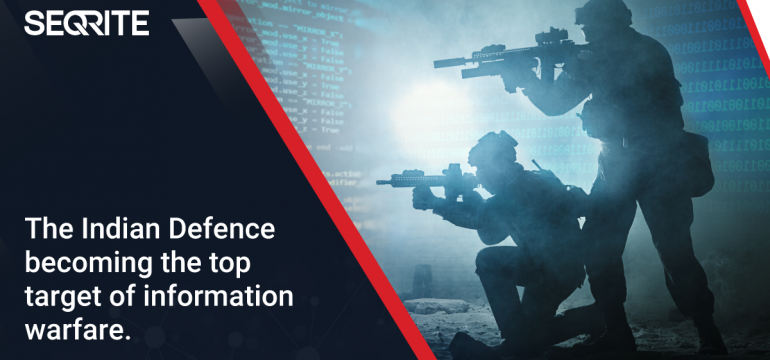In the current modern era of information warfare, securing military assets has become strategically very important. Recently, Seqrite reported on Operation ‘Honey Trap’, an operation launched by a Pakistan-linked threat actor allegedly, which targeted employees from Indian defence organizations.
Nation-state cybersecurity threats have become the new normal. In November last year, a critical cyberattack was launched against an Indian nuclear plant. The threat to defence organizations and military installations is renewed and conventional threats are no longer the only concerns. All nations now face enormous risks of attacks being carried out on their critical defence installations for espionage or sabotage purposes. These are direct threats to the sovereignty of nation-states and hence, must be critically examined and combated.
The defence sector is a high-profile target for several reasons.
- The importance of data
A country’s defence sector contains extremely confidential data related to current military strength & capabilities, future advancements, confidential agreements with other countries and more. In the wrong hands, this data could be extremely dangerous and not just to the organization to which it belongs, but to an entire nation. Enemy nations or terrorists could utilize this information to launch attacks leading to loss of lives or critical infrastructure.
- An immediate reputational damage
A key tenet of international relations is the policy of deterrence. Nation-states deter enemies by showcasing their strengths. However, cyberattacks can prick that deterrence bubble, leaving the concerned nation losing face and opening it up to negativity and reputational loss.
- Gaining enemy intelligence
Attacks on defence organizations are often conducted to gain insider and covert access to systems. These enable threat actors from enemy countries to act as modern-day spies and infiltrate enemy systems. Intelligence can be gathered, subverted and even sabotaged in this way without the organization and the country becoming even aware of this espionage. This intelligence can also be used to anticipate and create counter measures.
- Modern-day cyberwarfare
Modern-day militaries rely heavily on digital attacks and cyberwarfare is an increasingly likely possibility. All other major nations have invested in their cyberwarfare capabilities. In a 2018 report, the United States Department of Defense states that “the Department must take action in cyberspace during the day-to-day competition to preserve U.S. military advantages and to defend U.S. interests”. Attacks on defence organizations could be carried out by enemy states as a means of cyberwarfare.
The risk of cyberattacks for defence organizations is pronounced. Cyberattacks on defence organizations don’t just lead to financial or reputation damages – they could well create a threat to the sovereignty and integrity of a nation. The stakes are extremely high and that requires defence organizations to embrace a security-first mindset at every stage of their operations.
For the defence sector, a few aspects of enterprise security remain significant. Data encryption of the best standard is a necessity in this sector, considering the valuable nature of the data. Access controls are also crucial in this sector regulating the information that employees can access. Ultimately, there must be a defined strict and cadence into the entire cybersecurity process which can keep the fundamentals strong. Seqrite’s range of security solutions provides defence organizations with powerful capabilities to protect their data and thrive in the digital era.




